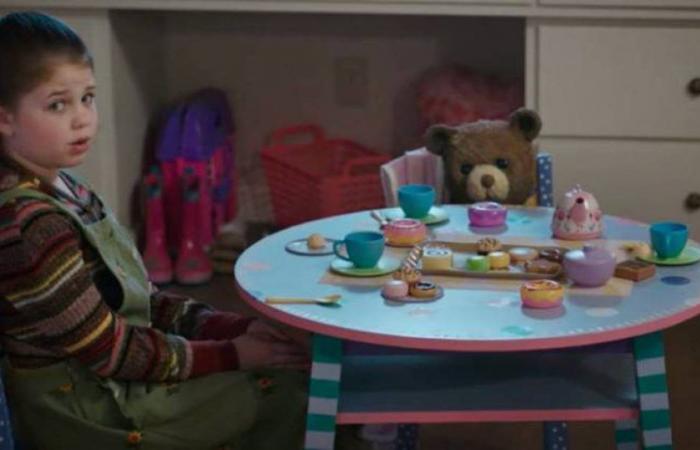Nothing in the first hour and little Imaginary – Devil’s Toy can prepare you for the bizarre things that await you in the third act of the film. The new horror feature from Blumhouse hides his most out-of-the-curve tendencies so well, and ends up releasing them so recklessly, in such a surprising way, that the impulse is to praise the director Jeff Wadlow (in Truth or Dare It is Fantasy Islandboth also financed by the studio) for what is almost an illusionist trick – or what in English would be called “bait-and-switch”, in reference to the commercial practice of attracting the consumer with a cheap product and then selling it to them something much more exclusive and, therefore, more expensive.
And in fact there is art in this contrast, in this deception. Wadlow builds much of Imaginary on top of the most basic platitudes of mid-budget horror, constantly dodging opportunities to lean on the trash. Despite the Brazilian subtitle, for example, Devil Toy refuses to dive headfirst into the killer doll subgenre, and even hesitates to show his evil teddy bear moving around much. The most the film does, in terms of stylistic suggestion, is to include slightly deformed hauntings in the background of its scenes, always out of focus, a game that is not new in horror cinema, but which causes some discomfort nonetheless.
It is, in short, such an unrestricted commitment to the mediocre, such an inflexible confinement to the ordinary, that it is difficult not to think that it is purposeful – an exercise in emptying the pillars of contemporary horror, designed to collide with the explosion of creativity that comes next. And here might be a good time to point out that Wadlow shares screenwriting credit with Imaginary with Greg Orb It is Jason Oremlanda duo whose curriculum consists mainly of children’s titles such as Monster High: The Movie, UglyDolls and the animation The princess and the Frog, from Disney. Considering the structure that the film eventually takes on, it seems like a relevant detail.
In the plot of ImaginaryJessica (DeWanda Wise) moves back to her childhood home, alongside her new husband Max (Tom Payne) and two stepdaughters, Alice (Pyper Braun) and Taylor (Taegen Burns). There, little Alice seems to become attached to an imaginary friend, initially incarnated in the teddy bear she calls Chauncey, who forces her to carry out increasingly strange and, eventually, violent missions. What could be another haunted house story, or another exploration of the macabre potential of children’s imagination (to be fair, the film even invests a little in this aspect during the climax) gradually turns out to be, essentially… well, a Disney adventure.
To know: Imaginary it’s more like If My Bed Could Talk (1971), Abracadabra (1993) and Halloweentown (1998) than for the live-action remakes of classic animations that the studio relies on today. And the film’s creative team seems to understand all the touchstones of this subgenre, from the child protagonist full of theatrical mannerisms (Pyper Braun, from Raven’s Housemakes a great emulation of Drew Barrymore) to the eccentric elderly supporting character who is in the film just to explain its convoluted mythology (Betty Buckleyin Carrieit’s a good Debbie Reynolds), passing through the unexpected erudite aesthetic inspiration of its fantasy sequences (how about a pinch of MC Escher in your popcorn movie this time?).
There is something subversive about how Imaginary embraces these and other signifiers in order to free yourself from others, which you consider to be immensely more limiting. Inserting the skeleton of a nostalgic Disney fantasy within the logic of an adult horror from Blumhouse allows, perhaps obviously, for the more grotesque subtext of the first to be made explicit within the space left by the second. And the iconographic current of Imaginary emerges in the production design of Meghan C. Rogers (Preacher), full of rubber creatures and distorted scenarios that rely on a fearless perversion of the domestic, the childish, the familiar. It’s a genuinely brilliant work, perched on the perfect threshold between disturbing and exhilarating.
But even better is how the film does everything very consciously, how it realizes and underlines the fundamental aesthetic emptiness of the average contemporary commercial horror that Jason Blum he shepherded it for the last decade, only to then reject it with the vitality of a last half hour energized by the possibilities of a type of cinema completely alien to him. One must appreciate that Wadlow, perhaps hardened by his previous experiences with the studio, chose to use his third opportunity in the field to amplify an inventive shock that is increasingly necessary for Hollywood horror – even if it inevitably resulted in a film frustrating.
Why, to be honest, it’s hard to defend Imaginary as an integral work, as a cinema experience. Precisely because it is so neatly divided between boredom and inspiration, the film is more homework than entertainment… but, as a cultural thesis and an exercise in provocation, few recent horror films have proven as vital as this one.
Imaginary – Devil’s Toy
Imaginary
Imaginary – Devil’s Toy
Imaginary
Year: 2024
Country: USA
Duration: 104 min
Director: Jeff Wadlow
Screenplay: Jason Oremland, Greg Erb, Jeff Wadlow
Cast: Tom Payne, Veronica Falcón, Betty Buckley, DeWanda Wise, Pyper Braun, Taegen Burns
Where to watch:






